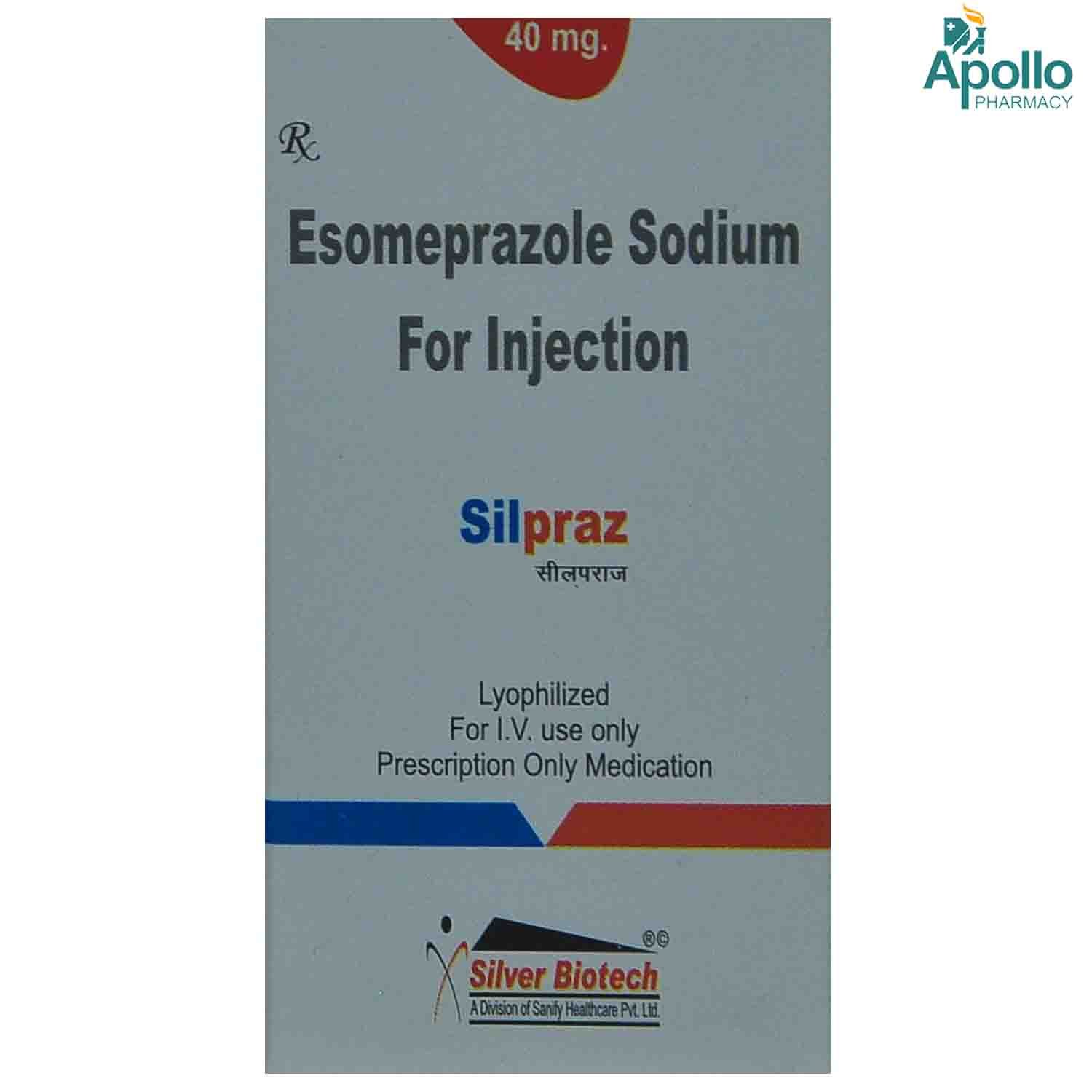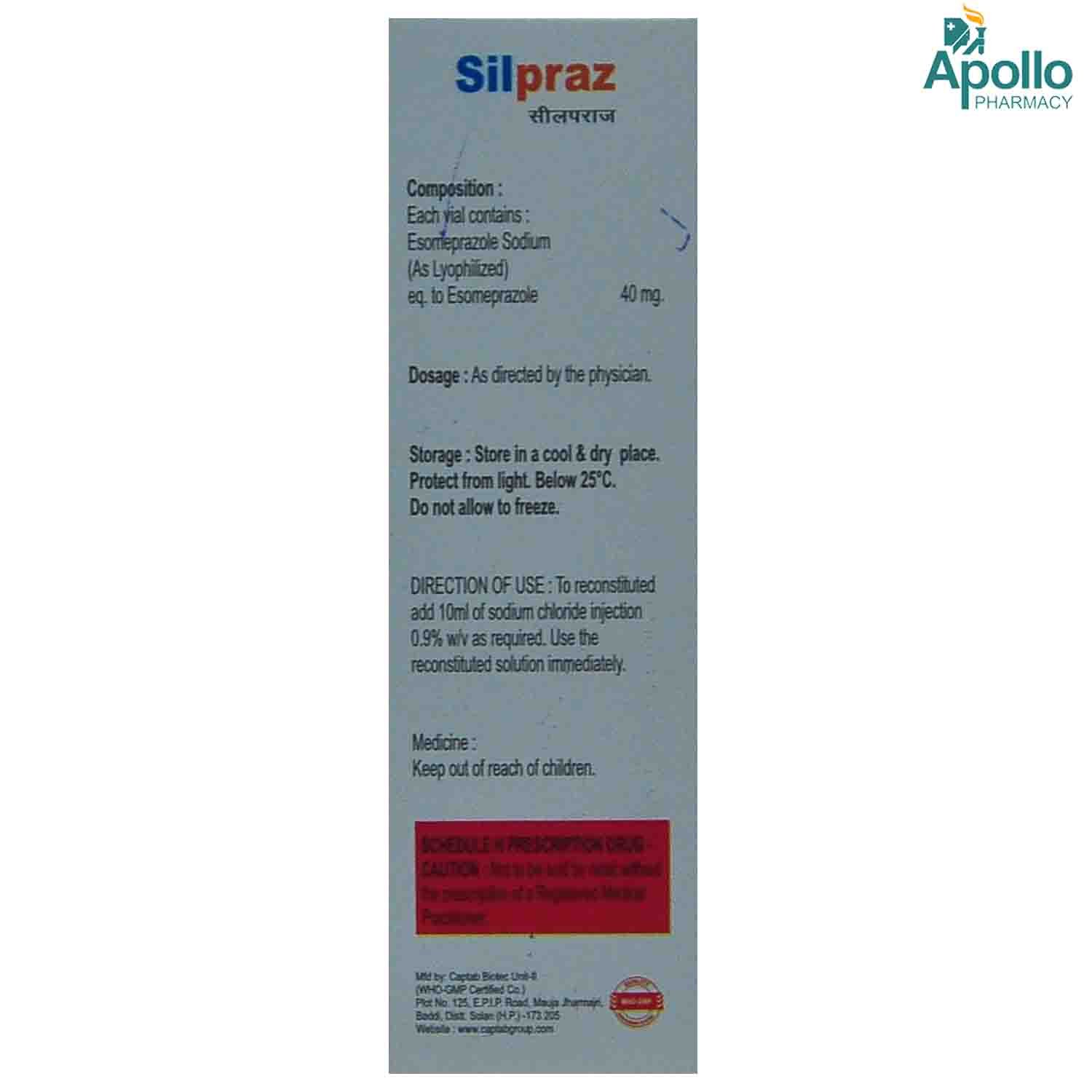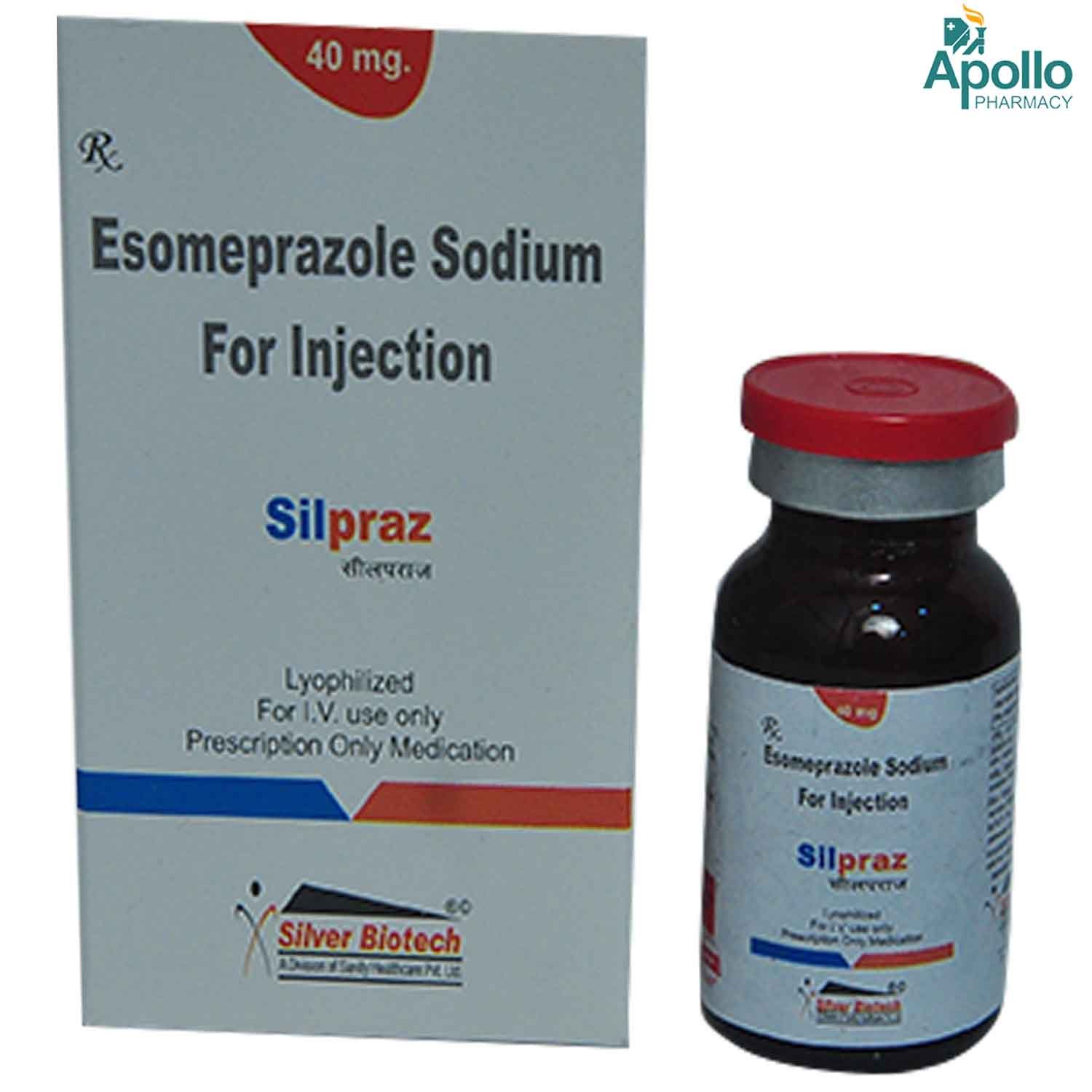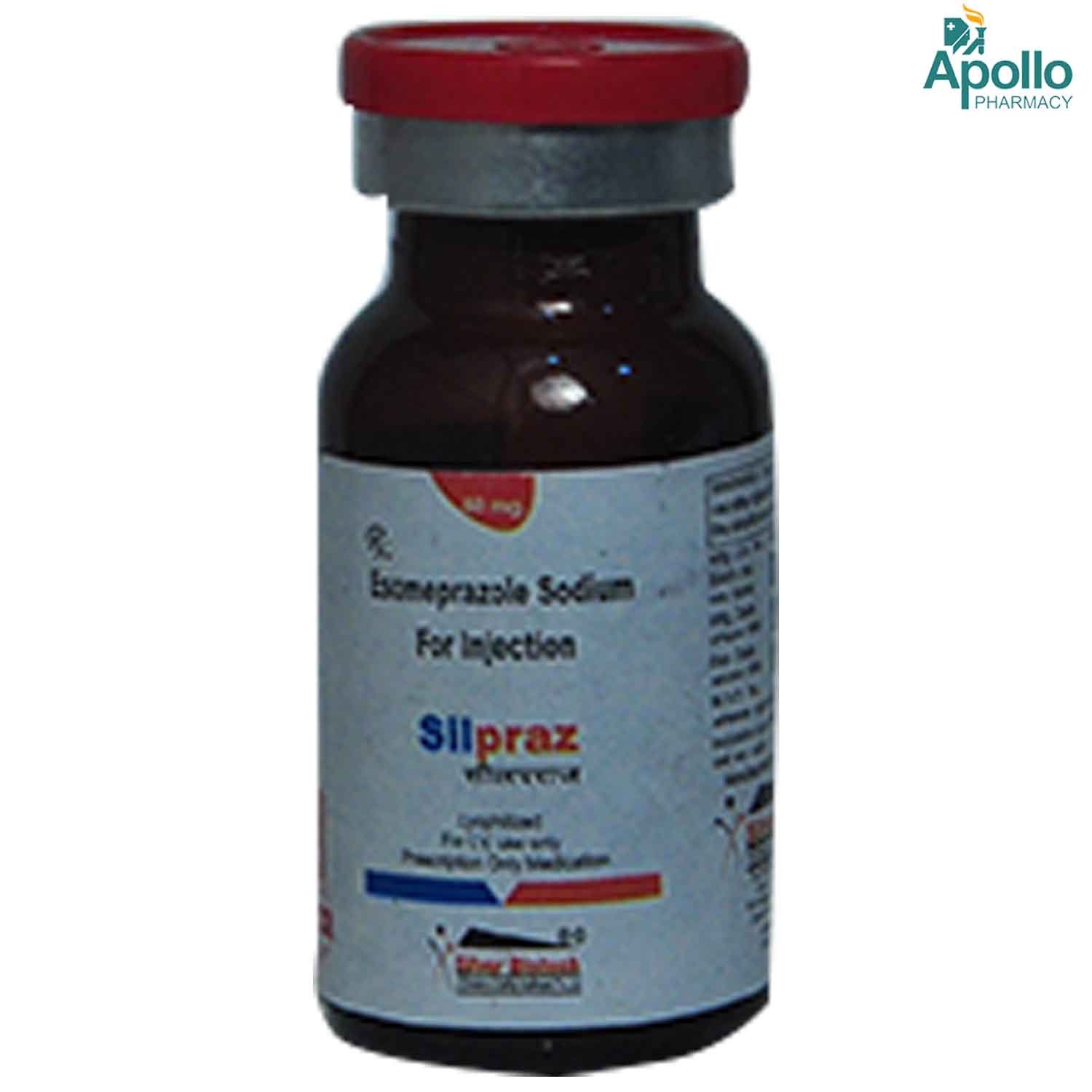Silpraz 40 mg Injection 1's
MRP ₹140.5
(Inclusive of all Taxes)
₹21.1 Cashback (15%)
Provide Delivery Location
Online payment accepted
 Prescription drug
Prescription drugWhats That
Composition :
Manufacturer/Marketer :
Consume Type :
Expires on or after :
Return Policy :
About Silpraz 40 mg Injection
Silpraz 40 mg Injection belongs to the class of drugs known as proton pump inhibitors used for the short-term treatment of gastroesophageal reflux disease (GERD) and stomach ulcers caused by NSAIDs. It also reduces the risk of further ulcer bleeding following an endoscopy in adults. Silpraz 40 mg Injection is indicated in adults and children aged 1 month or older who have had damage to their oesophagus and are unable to take esomeprazole by mouth.
Silpraz 40 mg Injection contains 'Esomeprazole' that works by reducing the amount of acid made in the stomach. As a result, it relieves symptoms of gastroesophageal reflux disease (GERD) and stomach ulcers.
Silpraz 40 mg Injection will be administered by a healthcare professional; do not self-administer. In some cases, Silpraz 40 mg Injection may cause headache, diarrhoea, stomach pain, constipation, wind (flatulence), nausea, vomiting, and injection site reactions such as pain, itching, swelling or redness. Most of these side effects do not require medical attention and may resolve with time. However, if they persist or worsen, consult a doctor.
Do not take Silpraz 40 mg Injection if you have/had any allergy or hypersensitivity to esomeprazole, any other proton pump inhibitor medications (such as pantoprazole, lansoprazole, rabeprazole, or omeprazole), or any of the other ingredients in Silpraz 40 mg Injection. Let your doctor know if you are taking nelfinavir (used to treat HIV infection). Consult your doctor if you are breastfeeding, pregnant, or intend to become pregnant.
Uses of Silpraz 40 mg Injection
Directions for Use
Key Benefits
Silpraz 40 mg Injection contains esomeprazole which belongs to the class of drugs known as proton pump inhibitors used to treat gastroesophageal reflux disease (heartburn) and stomach ulcers caused by the use of NSAIDs (Non-Steroidal Anti-Inflammatory Drugs). It is also used to reduce the risk of further ulcer bleeding following an endoscopy in adults. Silpraz 40 mg Injection works by irreversibly blocking the proton pump gate (which secretes stomach acid), thereby reducing stomach acid and treating acidity-related conditions.
Storage
- Hydrate your body: Drink enough water to prevent dehydration and headaches.
- Calm Your Mind: Deep breathing and meditation can help you relax and relieve stress.
- Rest and Recharge: Sleep for 7-8 hours to reduce headache triggers.
- Take rest: lie down in a quiet, dark environment.
- Cold or warm compresses can help reduce tension.
- Stay Upright: Maintain good posture to keep symptoms from getting worse.
- To treat headaches naturally, try acupuncture or massage therapy.
- Over-the-counter pain relievers include acetaminophen and ibuprofen.
- Prescription Assistance: Speak with your doctor about more substantial drug alternatives.
- Severe Headaches: Seek emergency medical assistance for sudden, severe headaches.
- Frequent Headaches: If you get reoccurring headaches, consult your doctor.
- Headaches with Symptoms: Seek medical attention if your headaches include fever, disorientation, or weakness.
- Tell your doctor about your GAS symptoms. They may change your medication regimen or prescribe additional drugs to help you manage them.
- To manage GAS symptoms, eat a balanced diet of fibre, vegetables, and fruits.
- Drink enough water throughout the day to avoid constipation and treat GAS symptoms.
- Regular exercise like yoga and walking may help stimulate digestion and alleviate GAS symptoms.
- Take probiotics only if your doctor advises, as they may help alleviate GAS symptoms by promoting gut health.
- Take medication for GAS symptoms only if your doctor advises, as certain medications can interact with your existing prescriptions or worsen symptoms.
- If symptoms persist, worsen, or are accompanied by severe abdominal pain, vomiting, or bleeding, seek immediate medical attention.
- Inform your doctor about dizziness symptoms. They may adjust your medication regimen or prescribe additional medications to manage symptoms.
- Follow your doctor's instructions for taking medication, and take it at the same time every day to minimize dizziness.
- When standing up, do so slowly and carefully to avoid sudden dizziness.
- Avoid making sudden movements, such as turning or bending quickly, which can exacerbate dizziness.
- Drink plenty of water throughout the day to stay hydrated and help alleviate dizziness symptoms.
- If you're feeling dizzy, sit or lie down and rest until the dizziness passes.
- Track when dizziness occurs and any factors that may trigger it, and share this information with your doctor to help manage symptoms.
- Tell your doctor about the cough symptoms you're experiencing, which may be triggered by your medication.
- Your doctor may adjust your treatment plan by changing your medication, adding new medications, or providing guidance on managing your cough symptoms.
- Practice good hygiene, including frequent handwashing, avoiding close contact with others, and avoiding sharing utensils or personal items.
- Stay hydrated by drinking plenty of fluids, such as water, tea, or soup, to help thin out mucus and soothe your throat.
- Get plenty of rest and engage in stress-reducing activities to help your body recover. If your cough persists or worsens, consult your doctor for further guidance.
- Report the itching to your doctor immediately; they may need to change your medication or dosage.
- Use a cool, damp cloth on the itchy area to help soothe and calm the skin, reducing itching and inflammation.
- Keep your skin hydrated and healthy with gentle, fragrance-free moisturizers.
- Try not to scratch, as this can worsen the itching and irritate your skin.
- If your doctor prescribes, you can take oral medications or apply topical creams or ointments to help relieve itching.
- Track your itching symptoms and follow your doctor's guidance to adjust your treatment plan if needed. If the itching persists, consult your doctor for further advice.
Drug Warnings
You should avoid taking Silpraz 40 mg Injection if you are allergic to any of its components, other proton pump inhibitors or if you are taking certain HIV medications such as nelfinavir. Keep your doctor informed about your health condition and all the medicines you take to rule out any side effects/interactions. Consult your doctor if you are a pregnant woman/nursing mother. Let your doctor know if you have liver/kidney problems or if you are due to undergo Chromogranin A test. Taking Silpraz 40 mg Injection for more than a year may modestly raise your risk of hip, wrist, or spine fracture. If you use corticosteroids (which can increase the risk of osteoporosis) or have osteoporosis, tell your doctor.
Drug-Drug Interactions
Drug-Drug Interactions
Login/Sign Up
Silpraz 40 mg Injection may reduce rilpivirine absorption and blood levels, making the medicine less effective against HIV.
How to manage the interaction:
Although taking Silpraz 40 mg Injection with Rilpivirine can possibly result in an interaction, they can be taken together if prescribed by your doctor. However, contact your doctor immediately if your symptoms do not improve. Do not discontinue using any medications without consulting a doctor.
Silpraz 40 mg Injection decreases the absorption of Pazopanib. This results in reduced efficacy of Pazopanib.
How to manage the interaction:
Although taking Silpraz 40 mg Injection and Pazopanib can possibly result in an interaction, they can be taken together if prescribed by your doctor. Do not stop taking any medications without consulting your doctor.
Taking gefitinib with Silpraz 40 mg Injection may reduce the effectiveness of gefitinib.
How to manage the interaction:
Although taking Silpraz 40 mg Injection and Gefitinib together can possibly result in an interaction, they can be taken together if prescribed by your doctor. It is recommended to take Gefitionib 12 hours before or after taking Silpraz 40 mg Injection. Do not stop taking any medications without consulting a doctor.
Combining Silpraz 40 mg Injection with Citalopram can increase the risk of irregular heart rhythm. .
How to manage the interaction:
Co-administration of Silpraz 40 mg Injection with Citalopram can possibly result in an interaction, but it can be taken if your doctor has advised it. If you're having any symptoms like irregular heart rhythm, dizziness, fainting, or shortness of breath, it's important to contact your doctor immediately. Do not stop using any medications without a doctor's advice.
Silpraz 40 mg Injection may interfere with the absorption of Acalabrutinib and reduce their efficacy.
How to manage the interaction:
Taking Silpraz 40 mg Injection with Acalabrutinib together can result in an interaction, but it can be taken if your doctor has advised it. Do not stop using any medications without talking to your doctor.
Taking nelfinavir with Silpraz 40 mg Injection may decrease the effects of nelfinavir.
How to manage the interaction:
Although taking Silpraz 40 mg Injection and Nelfinavir can possibly result in an interaction, they can be taken together if prescribed by your doctor. Do not stop taking any medications without consulting your doctor.
Coadministration of Clopidogrel with Silpraz 40 mg Injection may reduce the effectiveness of clopidogrel.
How to manage the interaction:
Taking clopidogrel and Silpraz 40 mg Injection together possibly has an interaction, but you can take these medications together if your doctor has advised it. Do not stop using any medications without talking to your doctor.
Taking tacrolimus with Silpraz 40 mg Injection may significantly increase the blood levels of tacrolimus, which can lead to an increased risk of side effects.
How to manage the interaction:
Although taking Silpraz 40 mg Injection with Tacrolimus can result in an interaction, they can be taken together if prescribed by your doctor. However, contact a doctor immediately if you experience irregular heartbeat, blurring of vision, fever, chills, or muscle spasms. Do not discontinue any medications without consulting a doctor.
Silpraz 40 mg Injection reduces the absorption of atazanavir, resulting in reduced efficacy of atazanavir.
How to manage the interaction:
Although there is a possible interaction between Silpraz 40 mg Injection and atazanavir, they can be taken together if prescribed by a doctor. Do not stop using any medications without consulting a doctor.
Silpraz 40 mg Injection can make Dacomitinib less effective by reducing its absorption and lowering its concentration in the blood.
How to manage the interaction:
Co-administration of Silpraz 40 mg Injection with Dacomitinib can result in an interaction, but it can be taken if your doctor has advised it. Do not stop using any medications without talking to your doctor.
Drug-Food Interactions
Drug-Food Interactions
Login/Sign Up
Diet & Lifestyle Advise
- Avoid intake of acid or heartburn-triggering foods or drinks like onions, peppermint, chocolate, caffeinated beverages, citrus fruits or juices, tomatoes, high-fat and spicy foods.
- Before going to sleep, try to raise your bedhead so that your head and chest are higher than your feet. Do not use piles of pillows. Instead, one raised block is fine. This will not allow the stomach acid to backflow through your food pipe.
- Avoid alcohol and smoking. Alcohol can raise the production of stomach acid leading to heartburn and acid reflux. On the other hand, smoking damages the sphincter, which prevents backflow of the stomach acid back into the food pipe.
- Include high fibre-containing foods, berries, cherries, leafy green vegetables (kale, spinach) and black peppers in your meal. These foods are full of antioxidants, calcium and vitamin B 12 that can help cope with the long-term effects of the medicine.
- Fermented dairy products like miso, sauerkraut, and kimchi contain probiotics which help prevent excess stomach acid production. Cranberry juice can be beneficial for peptic ulcers and H pyroli infection.
- Avoid sitting continuously as it can increase stomach acid production. Take a break of 5 minutes in 1 hour by brisk walking or stretching.
Side Effects of Silpraz 40 mg Injection
- Headache
- Diarrhoea
- Stomach pain
- Constipation
- Wind (flatulence)
- Nausea
- Vomiting
- Injection site reaction
- Benign polyps in the stomach
Habit Forming
Therapeutic Class
All Substitutes & Brand Comparisons
RX
Out of StockFumazole 40 Injection
₹94
(₹84.6 per unit)
33% CHEAPERRX
Out of StockEsotuf Injection
₹95
(₹85.5 per unit)
32% CHEAPERRX
Out of StockEsodan 40mg Injection
₹99
(₹89.1 per unit)
29% CHEAPER
Author Details
We provide you with authentic, trustworthy and relevant information
Drug-Diseases Interactions
Drug-Diseases Interactions
Login/Sign Up
FAQs
Drug-Drug Interactions Checker List
- CLOPIDOGREL
- WARFARIN
- ATAZANAVIR
- NELFINAVIR
- KETOCONAZOLE
- ITRACONAZOLE
- ERLOTINIB
- METHOTREXATE
- DIAZEPAM
- CILOSTAZOL
- CISAPRIDE
- DIGOXIN
- CITALOPRAM
- IMIPRAMINE
- PHENYTOIN
- TACROLIMUS
- RIFAMPICIN
- ST JOHN'S WORT
Disease/Condition Glossary
Gastroesophageal reflux disease (GERD): Gastroesophageal reflux disease (GERD) is a condition in which stomach acid flows back into the food pipe (oesophagus). This backflow (acid reflux) irritates the food pipe and causes heartburn. GERD symptoms include chest pain, difficulty swallowing, regurgitation (expulsion of food from the pharynx or oesophagus) of food/sour fluids, and a burning sensation in the chest.
Stomach ulcers: Stomach ulcers are sores (small, shallow wounds) that form on the lining of the stomach as a result of erosion of the stomach's protective coating. Symptoms include nausea, changes in appetite, bloody or dark faeces, unexplained weight loss, vomiting, and indigestion. If the ulcer is not treated, it can cause internal bleeding, peritonitis (inflammation of the abdominal wall), and pyloric stenosis (obstruction of the gastric outlet).

Have a query?
Alcohol
Safe if prescribed
Drinking alcohol or alcoholic beverages with Silpraz 40 mg Injection may cause dehydration and elevate the level of stomach acid thereby decreasing its efficiency. So try to avoid/limit alcohol.
Pregnancy
Consult your doctor
Consult a doctor if you are pregnant. Your doctor will weigh the benefits and potential risks before prescribing Silpraz 40 mg Injection.
Breast Feeding
Consult your doctor
Consult a doctor if you are breastfeeding. Your doctor will weigh the benefits and potential risks before prescribing Silpraz 40 mg Injection.
Driving
Safe if prescribed
In rare cases, Silpraz 40 mg Injection may cause dizziness and impaired vision. Do not drive if you experience these symptoms.
Liver
Consult your doctor
Silpraz 40 mg Injection should be taken with precaution in patients with liver disease. Inform your doctor before receiving Silpraz 40 mg Injection if you have had a liver impairment/disorder history. The doctor will prescribe only if the benefits outweigh the risks.
Kidney
Consult your doctor
Silpraz 40 mg Injection should be taken with precaution in patients with kidney disease. Inform your doctor before receiving Silpraz 40 mg Injection if you have had a history of severe kidney impairment/disorder. The doctor will prescribe only if the benefits outweigh the risks.
Children
Safe if prescribed
Silpraz 40 mg Injection can be given to children aged 1 month or older under the supervision of a healthcare provider.













_0.jpg?tr=q-85)
